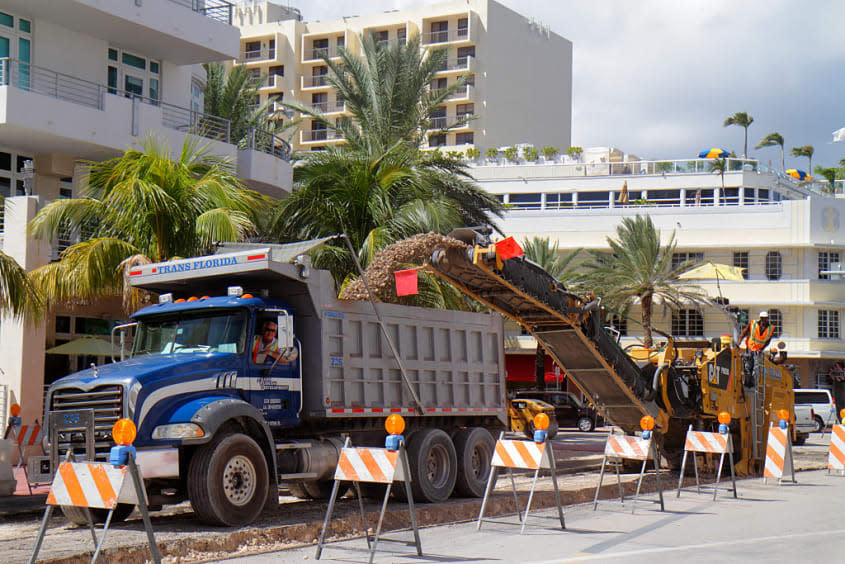Florida's controversial plan to pave roads with a radioactive material

- Oops!Something went wrong.Please try again later.
A bill in the Florida House of Representatives, HB 1191, could potentially allow the Sunshine State to pave its roads with a material, phosphogypsum, that is known to have a number of radioactive properties. Environmental groups are calling on Florida Gov. Ron DeSantis (R) to veto the bill.
What is the material?
Phosphogypsum is described by the U.S. Environmental Protection Agency (EPA) as "a waste product from manufacturing fertilizer." Phosphate rocks are dissolved to create phosphoric acid, which is used in fertilizer and other similar products. The excess left behind is phosphogypsum.
Phosphate rocks contain "small amounts of naturally-occurring radionuclides, mostly uranium and radium," the EPA reported. As a result, phosphogypsum gives off traces of "the radioactive elements uranium, thorium, and radium," according to the agency. It can also emit the radioactive gas radon, which has been known to cause significant health problems. "About 21,000 lung cancer deaths each year in the U.S. are radon-related," the EPA said. "Exposure to radon is the second leading cause of lung cancer after smoking."
Why is phosphogypsum being considered as a paving material?
The bill says there is a public interest in finding ways to re-use materials that are clogging landfills. Phosphate mining is the fifth-largest mining industry in the U.S. by quantity of material mined, the EPA reported. In 2019 alone, an estimated 23 million metric tons of phosphate rock were removed from the ground. That process creates a lot of leftover phosphogypsum.
This waste must be stored in stacks "that resemble enormous ponds," explained The Associated Press. Called "gypstacks," these piles are often massive, spanning up to 800 acres and reaching 200 feet in height, per NPR. Florida alone has 24 of these stacks, which totals "about one billion tons of phosphogypsum, with 30 million new tons generated every year through the phosphate fertilizer mining industry," according to the AP.
This significant deposit of phosphogypsum means it is widely available almost everywhere in the state. According to a report from Florida Polytechnic University, the material would be "cheaper and as effective, if not more, as current road base materials," and its use in paving could "speed the degradation of waste and extend the life of a landfill."
What would the bill permit?
HB 1191 would allow Florida's Transportation Department to conduct studies to "determine [phosphogypsum's] feasibility as a paving material," the bill says. If approved, phosphogypsum "may be used as a construction aggregate material in accordance with specified regulations if the department determines it suitable for such use."
The bill was approved by a wide margin in Florida's GOP-led legislature and has a deadline of April 1, 2024, at which point the Transportation Department would issue a recommendation.
Why are environmental groups upset?
Environmental groups are concerned that large-scale projects using phosphogypsum could lead to the "contamination of air, water, and soil," The Washington Post reported. Many of these groups have directly asked DeSantis to veto HB 1191. The plan to have roads paved with phosphogypsum is "an egregious handout to an industry that has a lengthy history of damaging the environment and putting public health at risk," Ragan Whitlock, an attorney with the nonprofit Center for Biological Diversity, said in a press release.
The groups have also raised concerns about existing problems with the way phosphogypsum is stored. "The industry has a demonstrated history of inadequate management when it comes to phosphogypsum waste," the groups said, adding that the gypstacks are "prone to spills and sinkholes — like the breach at Piney Point and sinkholes at New Wales — that threaten Tampa Bay and the Floridan Aquifer."
What's next?
DeSantis hasn't said whether or not he'll veto HB 1191, though the Post noted he did veto a measure last year that would have raised costs for Floridians with solar panels. This may give some small indication as to what he might do. If he takes no action on the bill, it would go into effect automatically.
Phosphogypsum-paved roads were approved by the EPA in 2020, but the decision was reversed after the Biden administration took office. The agency told NPR that any plans to use phosphogypsum would require an EPA review.
You may also like
The college rankings rebellion

